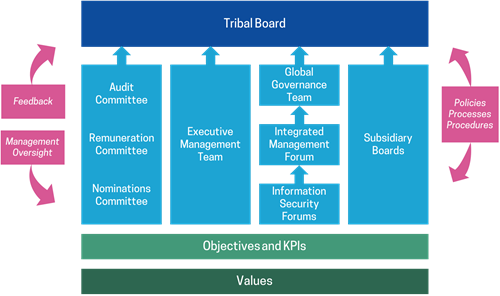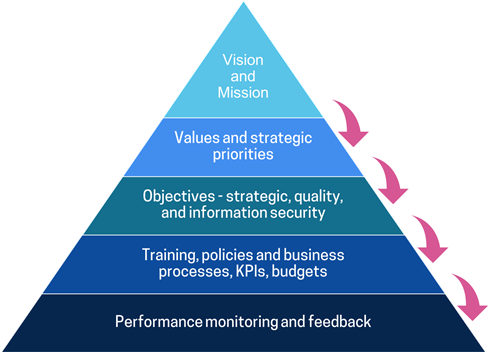
The PLC Board (“the Board”) is responsible for the Company’s corporate governance systems and processes that support good decision making.
The Non-Executive Directors, Richard Last (Chair), Roger McDowell and Nigel Halkes are all considered independent of management and free from any business or other relationships that could materially interfere with the exercise of their independent judgement. Whilst they all own shares in Tribal, this is not considered to alter their independent status.
Director’s Commitment to Tribal
Our Non-executive Directors have committed in their letters of appointment to attend all reasonable board and committee meetings in addition to being reasonably available at other times for Tribal business.
Our Executive Directors have entered into employment contracts which require them to attend all board and committee (of which they are a member) meetings.
The Non-Executive Directors meet at least once a year without the Executive Directors present. All Directors submit to re-election each year at the Annual General Meeting (“AGM”) of the Company.
The Board meets at least eight times each year with additional meetings when circumstances and urgent business dictate. At each meeting the Board reviews a schedule of reserved matters including trading performance, financial strength, strategy (including investment and acquisition opportunities), risk management, controls, compliance, reports to shareholders and succession management.
Board meetings are occasionally scheduled to take place at different Tribal office locations, to support active engagement with the business and ensure visibility to the Board of matters pertinent to each location.
A summary of Board and Committee meetings and attendance can be found in the Annual Report.
The Board members and their expertise, the roles of the Chair and Chief Executive Officer, and the roles of the Committees are listed here.
The Board Charter has been approved by the Board and details:
All other matters not specifically reserved to the Board are delegated to management in accordance with a schedule of delegation of execution, financial and negotiation authority policy. These delegated authorities cover expenditure, agreements, financial matters, remuneration, and agreements with third parties. Management is required to report to the Board concerning authority exercised and defer to the Board any matters which come, or may come, within the scope of the Board.
All the Directors have access to the advice and services of the Legal Counsel. Each Director is entitled, if necessary, to seek independent professional advice at the Company’s expense.
The Board nor any committee, have had cause to obtain external advice on any external matter.
The Board has a number of advisors used on a regular basis. Their detail can be found on our Investor Contacts area.
The Tribal Board is reviewed annually, with the evaluation process tying in to our annual planning cycle. The evaluation is initiated by the Chair, and with the consensus of the Tribal Board, agrees the need and scope of the evaluation, as well as whether it is conducted in-house or with the help of an independent external expert.
The board evaluation covers:
Outcomes of the Board evaluation are documented and an action plan put in place as needed. The actions may be owned solely by members of the Board or may be distributed to Tribal's Executive Management team as appropriate. Progress of the action plan is then tracked within the regular Board meetings.
Full details of outcome of the most recent Annual General Meeting and/or meeting of shareholders can be found here.
The Annual Reports, Notices of General Meetings and all other governance material for the last 5 years can be accessed here.
Our corporate culture is shaped by our Vision, Mission and Values.

The Executive Management Team sets strategic, quality management and information security objectives on an annual basis (overseen by the Board). These objectives are integrated into day to day business activity through:
Our key policies can be found here.
We maintain an internal management framework that is in compliance with the ISO9001 Standard for Quality Management and ISO27001 Standard for Information Security.
Our Compliance Training Programme is compulsory for all new employees. Refresher training is also compulsory on a rolling basis over a 2-year period. Training is updated and delivered following the introduction of new or changes to applicable legislation or regulations.
Topics covered by Tribal’s Compulsory Training Programme include:
The Compliance Training Programme is actively supported by our senior management team, who personally undertake all modules. The landing page on the Compliance Training Programme site includes a statement personally drafted by our CEO, emphasising the importance of the training and Tribal’s commitment to compliance.
All job descriptions define how employees are expected to uphold Tribal’s Values and are mapped to our career competencies. Tribal has defined 40 competencies which, when combined, describe the behaviours which drive both our individual and collective success. Individual performance against both the relevant competencies and the corporate Values, and goal-setting in line with corporate objectives, is central to an employee’s annual review cycle.
Our incentive structures are designed to encourage ethical conduct in line with our Values, and specifically reward cross-functional collaboration. We operate a spot reward scheme, ‘Living the Values’; which explicitly recognises the demonstration of the Values. Annual pay reviews are based on individual performance, achievement and behaviours.
Tribal operates a comprehensive budgeting system whereby managers submit detailed budgets and forecasts, which are reviewed and, where appropriate, amended by Executive Directors prior to submission to the Board for approval. Each month, actual results are reported against budget and distributed to managers and are provided to the Board in advance of meetings.
Building trust with all our stakeholders is key to our success.